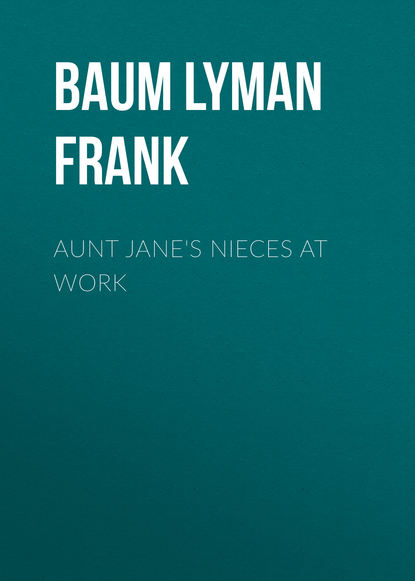По всем вопросам обращайтесь на: info@litportal.ru
(©) 2003-2024.
✖
Aunt Jane's Nieces at Work
Настройки чтения
Размер шрифта
Высота строк
Поля
"I know. He won't refuse to do what you ask him, for a man always listens to his wife when he knows she's right. You'll win, Mrs. Simmons, and I want to thank you for saving the election for us. If we get Mr. Simmons on our side I believe we'll be sure to defeat Hopkins."
"Oh, I'll do what I kin," was the ready promise, and after a few more remarks about the children and the neatness of the house, Louise took her leave.
"Will she win him over?" asked the girl of Mr. Watson, when they were jogging on to the next homestead.
"I really can't say, my dear," replied the old lawyer, thoughtfully; "but I imagine she'll try to, and if Dan doesn't give in Mrs. Simmons will probably make his life miserable for a time. You flattered them both outrageously; but that will do no harm."
And so it went on throughout the day. Sometimes the farmer himself was around the house, and then they held a sort of conference; Louise asked his advice about the best way to win votes, and said she depended a great deal upon his judgment. She never asked a man which side he favored, but took it for granted that he was anxious to support Mr. Forbes; and this subtle flattery was so acceptable that not one declared outright that he was for Hopkins, whatever his private views might have been.
When evening came and they had arrived at Elmhurst again, Louise was enthusiastic over her work of the day, and had many amusing tales to tell of her experiences.
"How many votes did you win?" asked Uncle John, smiling at her.
"I can't say," she replied; "but I didn't lose any. If one sows plenty of seed, some of it is bound to sprout."
"We can tell better after election," said Mr. Watson. "But I'm satisfied that this is the right sort of work, Mr. Merrick, to get results."
"So am I," returned Uncle John heartily. "Are you willing to keep it up, Louise?"
"Of course!" she exclaimed. "We start again bright and early tomorrow morning."
CHAPTER VIII
THE HONORABLE ERASTUS IS ASTONISHED
The Honorable Erastus Hopkins had been absent at the state capital for several days, looking after various matters of business; for he was a thrifty man, and watched his investments carefully.
Whenever his acquaintances asked about his chances for re-election, the Honorable Erastus Hopkins winked, laughed and declared, "it's a regular walk-over."
"Who is opposing you?" once asked a gray-haired Senator of much political experience, who had met Mr. Hopkins at luncheon.
"Young feller named Forbes – a boy, sir – with no notion about the game at all. He was pledged to an unpopular issue, so I was mighty glad to have him run against me."
"What issue is he pledged to?" asked the Senator.
"Oh, he's agin putting advertising signs on fences and barns, and wants to have them prohibited, like the infernal fool he is."
"Indeed. Then he's a progressive fellow. And you say his issue is unpopular?"
"That's what it is. It'll kill his chances – if he ever had any."
"Strange," mused the Senator. "That issue has been a winning one usually."
"What do you mean?" asked the astonished Hopkins.
"Why, the anti-sign fight has won in several places throughout the country, and local laws have been passed prohibiting them. Didn't you know that?"
"No!" said Hopkins.
"Well, it's true. Of course I do not know the temper of your people, but in a country district such as yours I would think an issue of that sort very hard to combat."
"Nonsense!" exclaimed the Honorable Erastus. "Ev'ry man Jack's agin the fool notion."
"Then perhaps the people don't understand it."
"Forbes has given up already," continued Hopkins, laughing at the recollection. "He's gone back into his shell like a turtle, an' won't come out to fight. I tell you, Senator, he's the worst licked candidate that ever ran for office."
Nevertheless, the suggestion that the anti-sign issue had been successful in other localities made Mr. Hopkins a trifle uneasy, and he decided to return home and keep the fight going until after election, whether young Forbes came out of his shell or not.
He arrived at Hilldale on the early morning train and went to his house for breakfast. To his amazement he found two great banners strung across the village streets bearing the words: "Vote for Forbes – the People's Champion!"
"Who in thunder could 'a' done that?" murmured Mr. Hopkins, staring open-mouthed at the great banners. Then he scratched his head with a puzzled air and went home.
Mrs. Hopkins, a tired-looking woman in a bedraggled morning wrapper, was getting the breakfast. She did not participate largely in the prosperity of her husband, and often declared she was "worked to death," although there were no children to care for.
"When did those Forbes banners go up?" asked Mr. Hopkins, irritably.
"I dunno, 'Rast. I don't keep track o' such things. But all the town was out to the girls' meetin' last night, an' I went along to watch the fun."
"What girls' meeting?"
"The girls thet air workin' fer to elect Mr. Forbes. It was in the town hall, an' all three of the girls made speeches."
"What about?"
"About Mr. Forbes, and how he orter be elected. He wants to beautify the farm places by doin' away with signs, an' he wants better roads, an' three new school-houses, 'cause the ones we've got now ain't big enough. An – "
"You blamed idiot! What are you talking about?" roared the exasperated Hopkins.
"Oh, you needn't rave at me, 'Rast Hopkins, just 'cause you're gettin' licked. I thought your goose was cooked the minnit these girls got to work."
Mr. Hopkins stared at her with a dazed expression.
"Be sensible, Mary, and tell me who these girls are. I haven't heard of 'em."
"Why, they're cousins o' Kenneth Forbes, it seems, an' come from New York to git him elected."
"What are they like?"
"They're swell dressers, 'Rast, an' nice appearin' girls, and mighty sharp with their tongues. They had a good meetin' last night and there'll be another at the town hall next week."
"Pah! Girls! Forbes oughter be ashamed of himself, to send a bunch o' girls out electioneerin'. I never heard of such an irregular thing. What do the boys say?"
"Folks don't say much to me, 'Rast. They wouldn't, you know. But I guess your game is up."
He made no reply. Here, indeed, was information of a startling character. And it came upon him like thunder out of a clear sky. Yet the thing might not be so important as Mrs. Hopkins feared.
Very thoughtfully he unfolded the morning paper, and the next moment uttered a roar of wrath and vexation. Briggs was one of his stand-bys, and the Herald heretofore had always supported him; yet here across the first page were big black letters saying: "Vote for Forbes!" And the columns were full of articles and paragraphs praising Forbes and declaring that he could and would do more for the district than Hopkins.

















